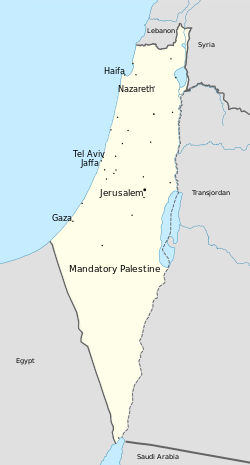British Palestine
| Mandatory Palestine | ||||||||||||||
| Mandate of the United Kingdom | ||||||||||||||
|
||||||||||||||
|
||||||||||||||
|
Mandatory Palestine in 1946
|
||||||||||||||
| Capital | Jerusalem | |||||||||||||
| Languages | English, Arabic, Hebrew | |||||||||||||
| Religion | Judaism, Christianity, Islam, Baha'i Faith, Druze | |||||||||||||
| Political structure | League of Nations Mandate | |||||||||||||
| High Commissioner | ||||||||||||||
| • | 1920–1925 (first) | Sir Herbert L. Samuel | ||||||||||||
| • | 1945–1948 (last) | Sir Alan G. Cunningham | ||||||||||||
| Historical era | Interwar period, World War II | |||||||||||||
| • | Mandate assigned | 25 April 1920 | ||||||||||||
| • | Britain officially assumes control | 29 September 1923 | ||||||||||||
| • | Creation of the state of Israel declared | 14 May 1948 | ||||||||||||
| Currency | Egyptian pound (until 1927) Palestine pound (from 1927) |
|||||||||||||
|
||||||||||||||
| Today part of | ||||||||||||||
Mandatory Palestine (Arabic: فلسطين Filasṭīn; Hebrew: פָּלֶשְׂתִּינָה (א"י) Pālēśtīnā (EY), where "EY" indicates "Eretz Yisrael", Land of Israel) was a geopolitical entity under British administration, carved out of Ottoman Southern Syria after World War I. British civil administration in Palestine operated from 1920 until 1948. During its existence the territory was known simply as Palestine, but, in later years, a variety of other names and descriptors have been used, including Mandatory or Mandate Palestine, the British Mandate of Palestine and British Palestine.
During the First World War (1914–18), an Arab uprising and the British Empire's Egyptian Expeditionary Force under General Edmund Allenby drove the Turks out of the Levant during the Sinai and Palestine Campaign. The United Kingdom had agreed in the McMahon–Hussein Correspondence that it would honour Arab independence if they revolted against the Ottomans, but the two sides had different interpretations of this agreement, and in the end the UK and France divided up the area under the Sykes–Picot Agreement—an act of betrayal in the eyes of the Arabs. Further confusing the issue was the Balfour Declaration of 1917, promising British support for a Jewish "national home" in Palestine. At the war's end the British and French set up a joint "Occupied Enemy Territory Administration" in what had been Ottoman Syria. The British achieved legitimacy for their continued control by obtaining a mandate from the League of Nations in June 1922. The formal objective of the League of Nations Mandate system was to administer parts of the defunct Ottoman Empire, which had been in control of the Middle East since the 16th century, "until such time as they are able to stand alone." The civil Mandate administration was formalized with the League of Nations' consent in 1923 under the British Mandate for Palestine, which covered two administrative areas. The land west of the Jordan River, known as Palestine, was under direct British administration until 1948. The land east of the Jordan, a semi-autonomous region known as Transjordan, under the rule of the Hashemite family from the Hijaz, gained independence in 1946.
...
Wikipedia



